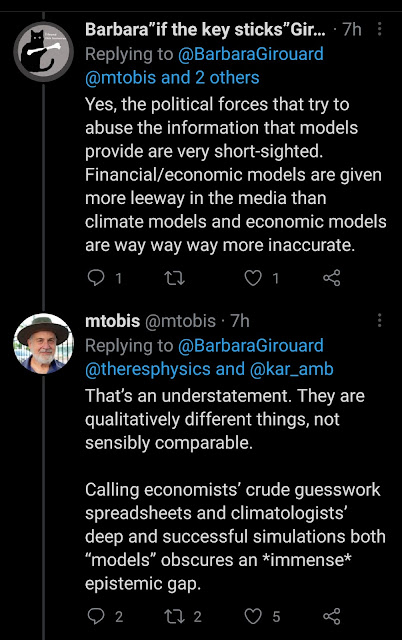That is, after all, pretty what has happened with the brief Pentagon UFO report.
Jazz Shaw, the right wing columnist who has been (for want of a better term) pro-UFO (and is just one of the Right wing figures who has been talking up this issue for the last couple of years) takes the "glass half full" view:
None of this should be taken to mean that the report was a dud. There were important admissions made by the ODNI on Friday.
One of the first was that the vast majority of “UAP” incidents they
studied “probably do represent physical objects.” They draw this
conclusion from the fact that most were picked up using multiple avenues
of sensory data, in addition to testimony from pilots and technicians
who watch the skies for a living. So it’s not just swamp gas, “ball
lightning,” or birds. And if you’ve seen one, you may not be crazy. (Or
if you are, it’s not because of this.)
The next thing the ODNI conceded was that the vast majority of
interesting cases they have been studying are truly “unidentified.” Out
of 144 incident reports, they were able to conclusively attribute
precisely one of them to a mundane event, specifically the
downing of a deflating weather balloon. They don’t know what the rest of
them are, and they’ve really been hunting for an explanation. Prior to
the release of the report, the Pentagon had already stated that what
people have been witnessing is not an example of secret United States
government technology. (How much faith one places in their claims at
this point is entirely up to the reader.) In the report, they went one
step further, saying that they “currently lack data to indicate any UAP
are part of a foreign collection program or indicative of a major
technological advancement by a potential adversary.”
While some dedicated, skeptical journalists might latch onto the phrase
“currently lack,” interpreting that to mean that the UFOs could still
turn out to be Chinese or Russian, this reading seems dubious. As the
report also notes, most of the reported sightings took place in
controlled airspace, in the midst of our naval battle groups and even
over military facilities in the middle of mainland North America. If
there were the slightest indication that those things came from Russia
or China and were showing up over our testing range in Nevada (it’s
happened), there wouldn’t be a “concern over possible national security
concerns.” We would already have the real-world, military equivalent of
Will Smith up there in an F/A-18E Super Hornet shooting them down.
And on the Left - which includes most scientists eager to pooh-pooh the "aliens are watching us" theory - we have David Corn writing an interesting column in which he explains that even though he saw (with others) something that pretty convincingly fits a "true UFO" description as a 12 year old boy, he just can't buy into "aliens are visiting us" any more.
David Corn's background (as it is with some others I have seen downplaying the Pentagon report) is that, as a child, he was seriously gullible on all UFO stuff - believing Erich Von Daniken's ancient astronaut guff, for example. (I soon learned the truth about that, even though, like most other kids seeing it the first time, I initially found it a bit spookily credible.)
He's a good example of something I have long felt: if someone has swung wildly from one side to another in the matter of politics, religion or (as it turns out) belief in UFO's, there's actually good reason to doubt their judgement. It's not really a matter of saying that people shouldn't ever believe anything firmly; but all belief should be tempered by some scepticism of your own certainty. Those who have swung wildly from one set of beliefs to the opposite - they don't fill me with confidence that they have an appropriate way of assessing their own thinking.
So, what do I think of the report? Of course, it is hard to know how to judge some of the cases when the material for them is still classified. And, as I have repeatedly said - I don't find the 3 videos alone all
that convincing; although I am also open to the suggestion that some of
the debunking of them is more speculative than concrete. (I understand
that there are some pilots who have disputed some of the Michael West
debunking, for example.)
I remain satisfied that the "tic tac" incident is one that is truly mysterious and "real", and (to my mind) unlikely to explained by earthly technology. It's been too long since it happened for the technology not to be revealed. But sure, the "alien drone" theory is a stretch.
That said, lately I get the feeling that, oddly, there may be collectively much more evidence for "alien drone" than we realise; it's just that when people face a weird incident, if it is only of short duration, they soon put it out of mind and don't press for anyone else to investigate, either.
David Corn's story, for example. (I have also been impressed by stories I have read over the years of guys who woke up while camping to find their tent or cabin flooded with light from above, but with complete and unearthly silence - which of course means it was not likely to be a chopper or pranksters. The light stays on for a length of time - making a meteor flash unlikely - and then blinks out in an instant.) But these sort of incidents are not collected by anyone central. There is no real life Mulder. The stories just turn up years later in magazines or on line when people want to tell of a mysterious life event that they never understood.
So yeah, it's funny, but probably the government never needed to cover up what it knew in terms of sensor evidence for UFOs, or sightings by military people - it could just rely on people seeing something weird, shrugging, and getting on with life.
It's a theory, anyway.


























